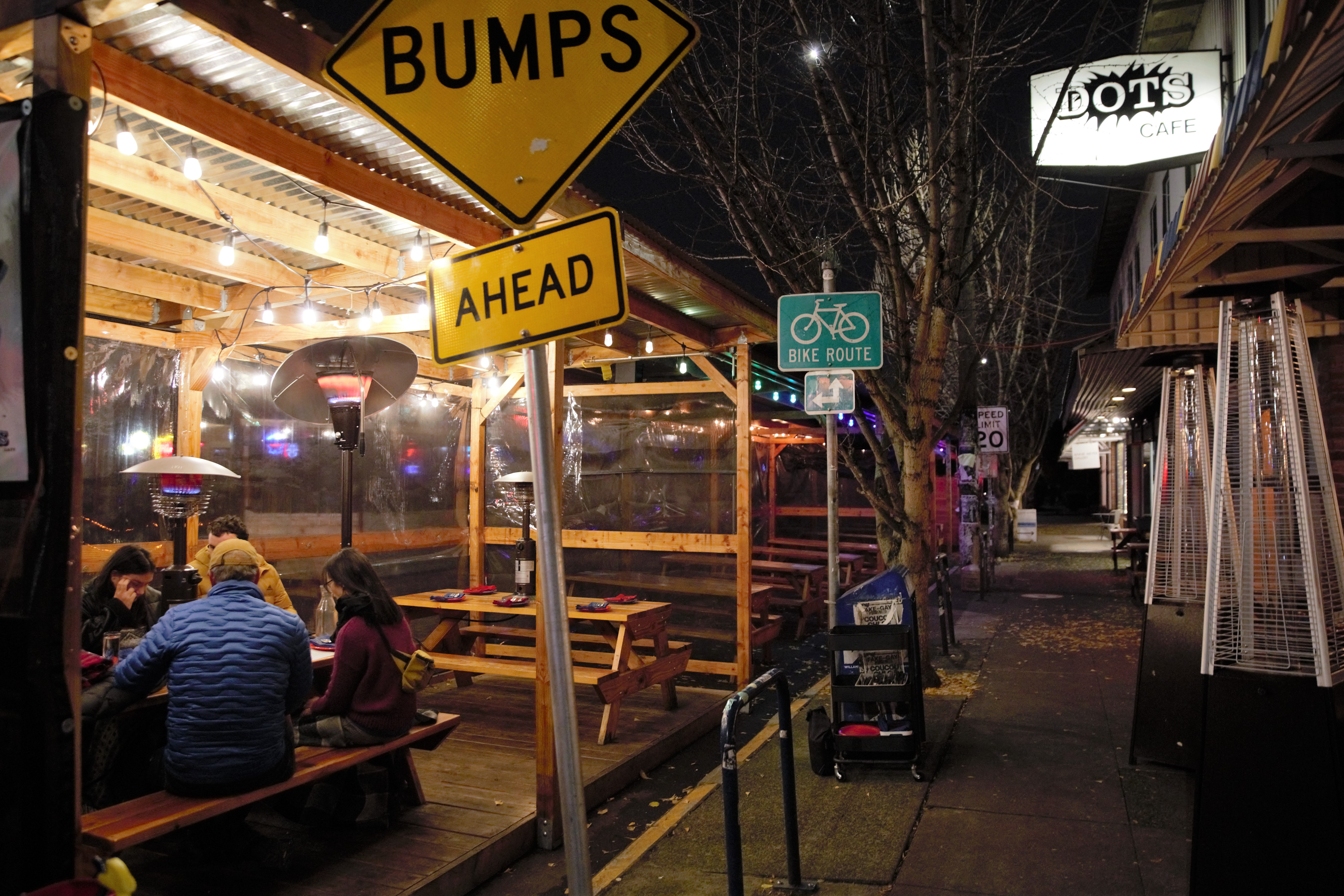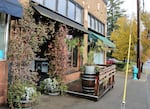
Adding outdoor dining was a lifeline during the pandemic for the owner of Dots Cafe in Southeast Portland. Restaurants and bars opened outdoor seating areas on top of parking spots, without charge, and today, customers at Dots Cafe are still utilizing the space.
Kristian Foden-Vencil / OPB
Dots Cafe has been a neighborhood fixture for decades.
The Southeast Portland restaurant is known for its cheese fries and burgers. But when the pandemic hit, owner Eli Johnson thought his business was doomed
“I was convinced that the government would not bail us out. That we were on our own,” he said. “I sold my house.”
Johnson was using the proceeds from his house to meet payroll when the government threw him a lifeline: Restaurants and bars would be allowed to open outdoor seating areas on top of parking spots, without charge.
Johnson was amazed. Permitting for outdoor seating would normally have taken a year or more, he said, let alone seating that took over part of the street was now a breeze.
He bought tents, picnic tables and string lights, and within a few days, he had a functional, if not particularly beautiful, patio.

Eli Johnson, the owner of Dots Cafe, said his business would have failed during the pandemic without the addition of outdoor dining.
Kristian Foden-Vencil / OPB
Customers turned up, paid the higher prices and stuck to the social distancing requirements.
“If it wasn’t for the tents and the portable heaters that … brought our business back, we’d be gone,” Johnson said. “No question about it.”
Hundreds of restaurants and bars did the same thing across Oregon. The looser rules changed the streetscape and calmed traffic.
Now COVID safety restrictions have largely been lifted, but cities don’t seem inclined to shut the street side seating down. Instead many cities are making them permanent.
Johnson spent $22,000 on lumber and roofing supplies for his outdoor seating, so he’s pleased he doesn’t have to take it all down.
He doesn’t even mind paying the city of Portland $144 every month for the four parking spaces he’s using.
“I think it’s fair,” he said.

Seating outside Rue Cler in Southeast Portland.
Kristian Foden-Vencil / OPB
Greg Astley, a spokesman for the Oregon Restaurant and Lodging Association, said owners are generally pleased their outdoor spaces are becoming permanent. And they don’t think cities are overcharging.
Free spaces no longer free
But this moment of consensus might be short-lived.
Dylan Rivera, the spokesman for the Portland Bureau of Transportation, said fees are going to increase: “Definitely,” he said, “You can count on it.”
The reason: City leaders will allow the patios to stay, but they’re also going to get tougher about enforcing safety rules.
City regulators need to check up on the 1,000 permits they issued. There’s a worry some patios went up so quickly, corners were cut, that patios might be too close to safety signs, for example, encroach on traffic, block sidewalks, or are properly insured.
“Frankly at some point, we’re going to need to take more of an enforcement approach,” Rivera said.

Portland transportation department spokesman Dylan Rivera, left, talks about the benefits of street patios with Eli Johnson, the owner of Dots Cafe.
Kristian Foden-Vencil / OPB
But any crackdown is likely to be measured because Portland leaders have another long-term goal: making streets more friendly to public gatherings.
Even before the pandemic the city already had permitting processes for businesses and members of the public to take over parking spots for short periods.
“Sometimes people would have little putt-putt golf games going on,” Rivera said. “Or ping pong tables or other fun activities to activate that street parking space.”
Rivera said the city considers patios and other outdoor restaurant spaces “parklets,” small public recreational areas.
The same is true in Bend. Licensing manager Lorelei Williams said making the patios and outdoor seating permanent has inspired owners to beautify them with heaters, lights and planters.
“I wouldn’t say any of them are major eyesores or anything like that, at this point,” Williams said

A street patio made out of pallets in Southeast Portland.
Kristian Foden-Vencil / OPB
The only problem that’s been reported, she said, was when someone backed into a patio’s protective concrete barriers.
Williams also said it’s mainly downtown restaurants that have taken advantage of the new patios. On the city’s edges, there’s more space, and restaurants tended to already have outdoor seating in garden areas or other spots before the pandemic.
Not all Oregon cities are allowing business owners to plan a long-term future with their new outdoor spaces. In Eugene, for example, outdoor seating areas created under looser COVID restrictions remain temporary, and restaurateurs are not required to pay.
Also, some restaurants are taking their patios down, but not because of the cost.
Baes Fried Chicken, for example, put its outdoor space up in front of a neighbor because there wasn’t room in front of the restaurant. Now that neighbor, a credit union, has asked that the seating be taken down because it obstructs street visibility.

Corkscrew Wine Bard owner Laura Cook.
Kristian Foden-Vencil / OPB
The owner of Corkscrew Wine Bar, Lauren Cook, said TriMet moved a bus stop so she could build a patio. Now the transit agency wants the space back. She’s going to miss it.
“I think it will absolutely impact the business,” Cook said.
Some businesses draw 85% of their income from their outdoor spaces during the summer. But that often flips in the winter, when customers want to be indoors.
Eli Johnson at Dots Cafe said the patio serves as a defacto public space when his restaurant is closed. He lets a person living on the streets rest there.
“They charge their phone on the extension plug. And that’s fine,” Johnson said. “They just have to know that when business is open, they get their stuff and find another place to be for eight hours.”
So in many Oregon cities, outdoor seating on the street is permanent. It’s just another way the COVID pandemic changed our lives.

The Corkscrew Wine Bar had to move its streetside seating because of a bus stop. But it is keeping a small sidewalk patio because of the importance of outdoor dining.
Kristian Foden-Vencil / OPB


